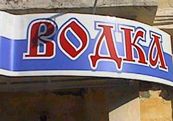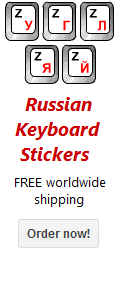| FR | About us | Home | User agreement | Link to us |
Seasons in Russian — Time of the Year
Is your city covered in fresh snow in winter? Do you find the parks at their best when leaves change color in autumn? What would you rather do over your summer vacation next year?
In this lesson, you will learn words for the seasons in Russian and what case to use when you want to say that something is going to happen "in" a certain season of the year. Just like in English, Russian seasons are not capitalized unless they are used in the beginning of a sentence.
| Audio | Russian word | English translation | Pronunciation |
| весна | spring | vees-NAH | |
| лето | summer | LYEH-tah | |
| осень | autumn, fall | OH-seen' | |
| зима | winter | zee-MAH |
To ask "At what time of the year... ?" use the phrase:
В какое время года... ? [fkah-KOYEH VRYEH-myah GOH-dah]
For example, "At what time of the year were you born?"
В какое время года вы родились? [fkah-KOYEH VRYEH-myah GOH-dah vi rah-DEE-lees']
Using the Instrumental Case with Seasons
In order to say that something is going to happen "in" a certain season, Russians change the word for season into the instrumental case. You don't need to use any prepositions because the instrumental endings (-ой, -ом, -ю) already convey the meaning of "in". The table below gives a few examples:
| Audio | Russian word | English translation | Pronunciation |
| весной | in spring | vees-NOY | |
| летом | in summer | LYEH-tahm | |
| осенью | in autumn | OH-seen'-yoo | |
| зимой | in winter | zee-MOY |
Adjectives for the Seasons
Adjectives are words that describe nouns or pronouns. You will need to know Russian adjectives for seasons to form phrases like "winter clothing" or "summer time". The table below shows the dictionary form of these adjectives (i.e. singular masculine nominative form).
| Audio | Russian word | English translation | Pronunciation |
| весенний | (adj.) spring | vee-SYEH-neey | |
| летний | (adj.) summer | LYEHT-neey | |
| осенний | (adj.) autumn | ah-SYEH-neey | |
| зимний | (adj.) winter | ZEEM-neey | |
| зимняя одежда | winter clothing | ZEEM-nee-ah ah-DYEHZH-dah |
If you were to say "winter clothing" in Russian you would have to use the adjective "winter" (зимний). In addition to that, the adjective "winter" (зимний) would have to agree with the noun "clothing" (одежда) in number, gender and case. Thus, the phrase "winter clothing" can be translated as "зимняя одежда". Here, the singular feminine noun "clothing" (одежда) is in the nominative case, and the corresponding form of the adjective "winter" is зимняя.
Furthermore, if you want to say "I wear winter clothing" then the noun "clothing" (одежда) must be changed into the accusative case, and the adjective "winter"(зимний) must be changed into the accusative as well. The correct translation of the sentence will be "Я ношу зимнюю одежду". See the lesson on adjectives in Russian for more information about agreement of adjectives with nouns.
Also, listen to a podcast that teaches Russian words for yesterday, today, tomorrow in Russian.
Audio recordings: Copyright© 2006 Streit Goulnara, Streit Eric, Vion Nicolas. Copyright© 2007 S. Sakhno, N. Vion. Distributed under CC-BY
Got questions?
Ask them in the Russian Questions and Answers — a place for students, teachers and native Russian speakers to discuss Russian grammar, vocabulary, pronunciation, and other aspects of the Russian language.
Copyright 2001-2026 MasterRussian.com | Privacy Policy | Contact Us
 Russian Lessons
Russian Lessons
- Russian alphabet
- Names of letters
- Russian Q&A new
- Pronunciation: Cons.
- Pronunciation: Vowels
- Noun Gender/Number
- Cases of Nouns
- Russian Greetings
- Personal Pronouns
- Learning Russian
- 1000 Common Words
- 500 Russian Verbs
- Top Russian Nouns
- » All lessons
- » Guest lessons
 Browse Topics
Browse Topics
- Start learning Russian
- Forum
- Bookstore
- Dictionaries
- Russian - basic
- Russian - adv
- Pronunciation
- Russian Blog new
- Reading
- Test & quizzes
- Translation
- Verbs
- Verb Conjugations
- Russian numbers
- Russian Tests new
- Vocabulary
- Writing
- Folk music
- Fun stuff
- Leo Tolstoy
- Learner's lore
- Literature
- Personal blogs
- Picture Dictionary new
- Proverbs
- Publications
- Radio & TV
- Russian culture
- Schools in Russia
- Russian Words
- Russian names
- Software
- Russian Words iPhone

Search MasterRussian

English » Russian dictionary

WORD OF THE DAY
![]() RSS
|
iGoogle
|
My Yahoo!
RSS
|
iGoogle
|
My Yahoo!
Meaning: road, route, way
Pronunciation: [dah-ROH-gah]
Learn Russian words more... »
TODAY'S STREET SIGN

Russian: Водка
English: Vodka
FOLLOW US ON TWITTER

MasterRussian on Twitter


